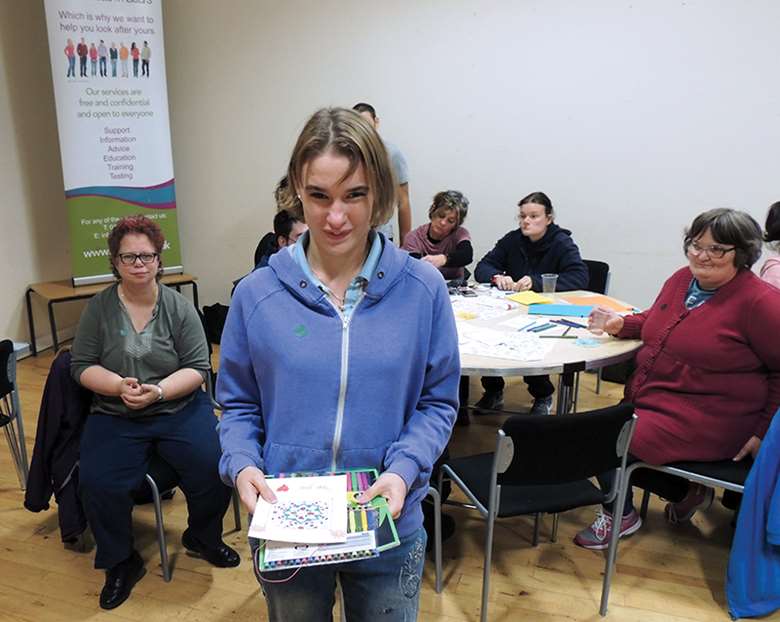ABC (Awareness, Balance, Choice), Dhiverse
Eileen Fursland
Tuesday, November 28, 2017
Sexual health charity provides sex education for young people with learning disabilities.

- One-to-one and group support offers advice on different aspects of sex and relationships
- More than 200 young people have been supported, with feedback positive
ACTION
The ABC (Awareness, Balance, Choice) programme provides sex and relationships education for people with a learning disability or difficulty. It is run by Dhiverse, a sexual health charity in Cambridge.
The programme is delivered in six weekly sessions for small groups with additional needs in mainstream schools and colleges, in special schools and in social enterprises that employ people with a learning disability or difficulty. The service also provides one-to-one support for individuals and for couples who are referred by their parents and professionals who work with them.
Liz MacKenzie, ABC programme manager, says the service helps overcome the problems of young people with autism or learning disabilities feeling isolated, lacking the opportunity to meet potential partners and who struggle to form relationships. It also challenges negative attitudes to young people with learning disabilities forming long-term relationships. "Some young people we work with say: ‘No, I can't do that'. They have been told it's not for them, or it's dirty," MacKenzie explains.
When sex and relationships education is taught as part of the mainstream school curriculum, students with learning disabilities are likely to struggle to understand and process the information. Even in special schools, staff and students alike can find it embarrassing to talk about sex and relationships.
MacKenzie set the programme up in 2015, with three years' funding from the Big Lottery Fund. Now she and three part-time facilitators deliver the programme across Cambridgeshire and neighbouring counties.
Sessions cover how to behave appropriately in different types of relationship - for example, with professionals and romantic partners; communicating effectively; recognising abusive behaviour and how to respond; staying safe online and on dates in the community; grooming; sexual health; and contraception. Each session lasts an hour and recaps on the previous one.
"You need to offer the information in accessible ways, using pictures and simple words," MacKenzie explains.
"Sometimes the content can be as basic as ‘this is what happens during sex'. One young man wanted to get engaged and he said: ‘I don't know how to do it so I've looked at porn'. We explained to him that they are acting and that's not what happens in a close, loving relationship."
The team work flexibly, adapting the content to the needs and interests of each group. Afterwards, some participants ask for one-to-one meetings. If the trainers learn about any safeguarding issues, they refer these to social workers.
Many of the parents who ask for one-to-one meetings for their child are concerned about their use of the internet - young people are accepting "friends" indiscriminately, chatting to strangers, even arranging to meet. Young people are often very trusting of others, says MacKenzie, and take longer to mature. But she also points out that the internet is an invaluable way for isolated young people, such as those living in the Cambridgeshire fens, to maintain friendships.
The team does a lot of preventative work, such as handling referrals from police if a young person with learning disabilities has had a lot of contact with a child or is encouraging them to meet. If the person is trying to start a sexual relationship, "we work with them and help them to understand it isn't appropriate", says MacKenzie.
It also provides training for professionals and parents, covering subjects such as consent and masturbation, which gives them confidence to discuss sexual health with young people.
MacKenzie says: "Lots of parents want their child to have a close relationship with somebody, but there's just that added anxiety of what could happen - are they going to be vulnerable? We talk to them about how they can keep their child safe but still give them freedom to form relationships."
IMPACT
From October 2016 to 2017 - the second year of the programme - 258 children and young people aged 12 to 25 either had one-to-one sessions or attended a group.
Many ABC participants say that they feel more confident about communicating what they want or don't want from a relationship and that they feel less anxious and more confident managing relationships. They also report that they have learned specifics, such as why a condom is used and how to fit one correctly on a demonstration model.
This article is part of CYP Now's special report on PSHE education. Click here for more




